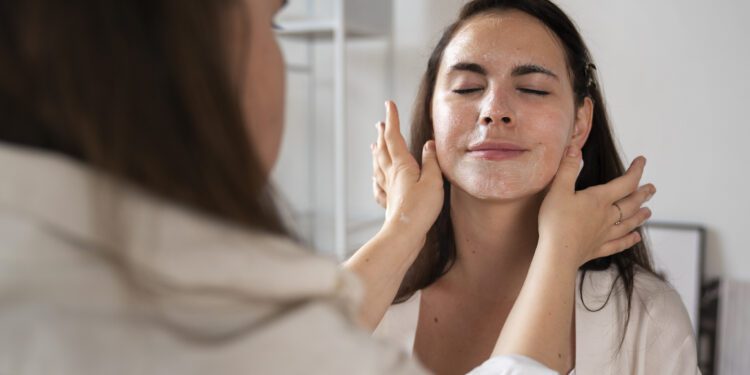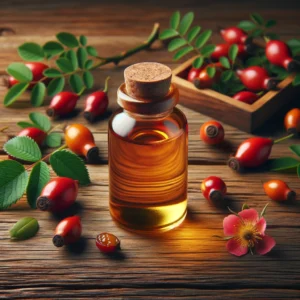Introduction
Dealing with acne scars can be a long journey. While there are numerous medical interventions available, many individuals begin their treatment with home remedies for acne scars, which can be just as effective Home Remedies for Acne Scars.
What Causes Acne Scars?
Acne scars form when the normal tissue in the skin is destroyed and replaced with fibrous tissue. You may experience different types of scars:
- Atrophic scars: These are small indentations in the skin.
- Hypertrophic scars: These appear as raised patches on the skin.
- Keloid scars: These are thick, textured scars that extend beyond the initial wound area and are typically darker than the surrounding skin.
Home Remedies for Acne Scars: Aloe Vera Benefits
Aloe vera is the best home remedies for acne scars it include anti-inflammatory effects from aloin and barbaloin, collagen-boosting gibberellins, moisturizing properties ideal for oily skin, antimicrobial action to prevent infections, and salicylic acid to reduce acne severity.
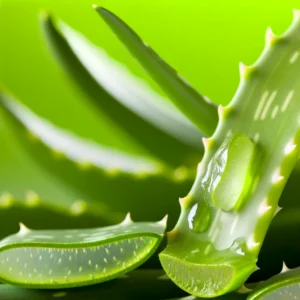
How to Use Aloe Vera for Acne & Scars
- Cleanse Your Skin: Start with clean, dry skin. This ensures that aloe vera can penetrate the skin without barriers.
- Extract the Gel: If using fresh aloe vera, slice a leaf from the plant, cut it open and scoop out the gel with a spoon. For convenience, you can also use pure aloe vera gel available commercially.
- Apply the Gel: Apply the aloe vera gel directly to the scarred area. Use your fingers to massage it gently into your skin in a circular motion.
- Let It Sit: Allow the gel to sit on your skin for about 30 minutes to an hour to ensure deep penetration. For more intensive treatment, you can leave it on overnight.
- Rinse Off: Rinse the gel off with cool water. Pat your skin dry with a clean towel.
- Repeat Regularly: For best results, apply aloe vera gel twice daily. Consistency is key to reducing the appearance of acne scars.
Home Remedies for Acne Scars: Lemon Juice Benefits
Lemon juice aids acne scar treatment through citric acid which exfoliates, vitamin C that boosts collagen and reduces pigmentation, and its natural bleaching properties. It also has antimicrobial effects to prevent further acne.
How to Use Lemon Juice for Acne & Scars
- Citric Acid: Lemon juice contains citric acid, a natural alpha-hydroxy acid (AHA) that helps exfoliate the skin. This exfoliation removes dead skin cells, promotes new cell growth, and can help fade scars and age spots.
- Vitamin C: Rich in vitamin C, lemon juice is an antioxidant that helps reduce skin damage and premature aging. Vitamin C is also crucial for collagen synthesis, which can help repair and heal the skin, reducing the appearance of scars.
- Natural Bleaching Agent: The lightening properties of lemon juice can help to naturally reduce the pigmentation of acne scars, making them less visible.
- Antimicrobial Properties: Lemon juice has antimicrobial properties that can help prevent bacterial infections that might exacerbate acne and promote the formation of new acne scars.
Home Remedies for Acne Scars: Honey Benefits
Honey reduces acne scars with its antibacterial properties, soothes inflammation, hydrates without oiliness, and offers antioxidants for skin repair and environmental protection.
How to Use Honey for Acne & Scars:
- Cleanse the Skin: Start with clean, dry skin to ensure better absorption of honey.
- Apply Raw Honey: Use a clean fingertip or a cotton swab to apply raw honey directly to the scars. If you have widespread acne or scars, you can apply a thin layer over the entire face.
- Leave On: Allow the honey to sit on the skin for about 30 minutes. Honey is gentle enough to be left on the skin for longer durations, even overnight, if desired.
- Rinse Off: Wash off the honey with lukewarm water and pat the skin dry with a soft towel.
- Repeat: For best results, apply honey daily. Regular use can help reduce inflammation and make scars less noticeable over time this is how to get rid of acne scars.
Home Remedies for Acne Scars: Apple Cider Vinegar Benefits:
Apple cider vinegar (ACV) treats acne scars effectively through its acetic acid, which combats bacteria, and alpha hydroxy acids that exfoliate the skin. Its anti-inflammatory properties reduce redness, while balancing skin pH enhances barrier function.

How to Use Apple Cider Vinegar for Acne Scars:
- Dilute ACV: Mix one part apple cider vinegar with three parts water to minimize potential skin irritation.
- Apply with a Cotton Ball: Dip a cotton ball into the diluted ACV solution and apply it directly to the scarred areas.
- Leave on for a Few Minutes: Start by leaving the solution on your skin for about 5-10 minutes to gauge skin sensitivity.
- Rinse Off: Rinse the area with water. If there’s no irritation, you can gradually increase the leave-on time up to 20 minutes.
- Moisturize: After rinsing, apply a gentle moisturizer to keep the skin hydrated.
- Repeat Regularly: Use this treatment at least once a day. Consistent use over weeks or months can produce the best results.
Home Remedies for Acne Scars: Coconut Oil Benefits
Coconut oil is valued for its skin healing properties, effective in reducing acne scars. It’s rich in fatty acids like lauric acid, offering antimicrobial and anti-inflammatory benefits to minimize outbreaks and scars. As a potent moisturizer, it hydrates and promotes skin health. Vitamin E and enhanced collagen production in coconut oil aid in skin repair and scar reduction.

How to Use Coconut Oil for Acne Scars:
- Choose Organic, Unrefined Coconut Oil: Start with high-quality coconut oil to ensure it’s free from additives that might irritate your skin.
- Cleanse Your Skin: Thoroughly clean the area where you’ll apply the coconut oil.
- Apply Directly: Take a small amount of coconut oil on your fingertips and massage it into the scarred area. The massaging helps to promote blood flow and absorption.
- Leave Overnight: For best results, leave the coconut oil on your skin overnight.
- Rinse in the Morning: Wash off the oil with warm water the following morning.
- Repeat Daily: Regular application is key to seeing significant results in the fading of acne scars.
How to Get Rid of Acne Scars on Butt
Tea Tree Oil for for Acne Scars:
Tea Tree Oil is celebrated for its exceptional antiseptic and anti-inflammatory properties, making it an effective natural remedy for butt acne scars and face scars. The oil contains terpinen-4-ol, which kills bacteria while soothing the skin. It reduces redness and swelling, promoting healing in damaged tissues and preventing new acne outbreaks. Ideal for sensitive areas, it should be diluted with a carrier oil to prevent skin irritation.
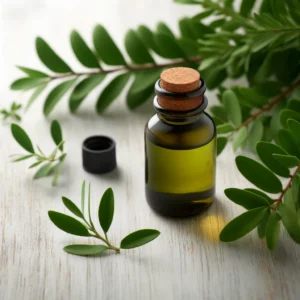
How to Use Tea Tree Oil for Butt Acne Scars and Face Scars
- Dilute the Oil: Tea tree oil is potent and should be diluted before application to avoid irritation, especially on sensitive skin areas like the face and buttocks. Mix a few drops of tea tree oil with a carrier oil like coconut oil, jojoba oil, or almond oil. A safe dilution ratio is typically 1 part tea tree oil to 9 parts carrier oil.
- Test for Sensitivity: Before applying broadly, do a patch test. Apply a small amount of the diluted tea tree oil to a part of your skin that’s easy to conceal. Wait for 24 hours to see if any irritation occurs.
- Cleanse the Area: Clean the area with mild soap and water to remove impurities and excess oils. Pat the skin dry with a clean towel. This step ensures that the tea tree oil can penetrate effectively without being blocked by dirt or oil.
- Apply Gently: Using a cotton ball or a clean fingertip, apply the diluted tea tree oil to the scars. Be gentle and apply a thin layer, ensuring not to rub the skin aggressively as this can cause further irritation.
- Leave It On: Allow the tea tree oil to absorb into the skin. For sensitive areas like the face, start by leaving it on for about 20-30 minutes. If you experience no discomfort, you can gradually increase the duration, potentially leaving it on overnight.
- Rinse Off: After the application period, rinse the area with cool water. If applied to the face, follow up with a gentle moisturizer to keep the skin hydrated. For the buttocks, ensure the area is thoroughly dry before dressing to avoid any moisture buildup, which can exacerbate acne.
- Repeat: Apply the diluted tea tree oil to the acne scars daily. Consistency is key in seeing results. Improvement in the appearance of scars can be observed with regular use over several weeks.
Additional Tips
- Always use 100% pure tea tree oil for the best results.
- Be cautious when using tea tree oil around sensitive areas like the eyes.
If irritation or excessive dryness occurs, reduce the frequency of application or discontinue use and consult a dermatologist.
Cucumber for for Acne Scars:
Cucumber is known for its hydrating and soothing effects, beneficial for treating butt acne scars and scars on the face. It provides a cooling effect which reduces skin irritation and inflammation. Rich in vitamins and minerals, cucumber enhances skin elasticity and accelerates the healing process of acne scars. Its natural astringent properties help to tighten pores and improve skin texture, making it a refreshing remedy for scarred areas.
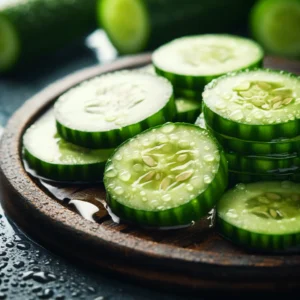
How to Use Cucumber for Butt Acne Scars and Face Scars
- Dilute the Juice: Cucumber juice is gentle and usually does not require dilution, but for the best results, blend it with other soothing ingredients like aloe vera gel or honey.
- Test for Sensitivity: Although cucumber is mild, it’s still wise to do a patch test. Apply a small amount of cucumber juice or pulp to a concealed area of skin and wait for any adverse reactions.
- Cleanse the Area: Wash the area with a gentle cleanser to remove any dirt and oils. This helps the cucumber’s nutrients to penetrate effectively.
- Apply Generously: Grate a cucumber to form a pulp, or blend it to create juice. Apply this directly to the affected areas using gentle motions. For larger areas, cucumber slices can be placed directly on the skin.
- Leave It On: Allow the cucumber to sit on the skin for about 30 minutes for maximum hydration and calming effects.
- Rinse Off: Wash the area with cool water and pat dry with a clean towel.
- Repeat Daily: Use cucumber treatments daily. This vegetable is known for its hydrating properties and can help reduce the visibility of acne scars with regular application.
Rosehip Seed Oil for for Acne Scars:
Rosehip Seed Oil is highly regarded for its ability to regenerate skin cells and improve skin flexibility, making it excellent for diminishing acne scars on the butt and face. It is packed with essential fatty acids, vitamin E, and vitamin C, all of which are crucial for promoting collagen production and reducing hyperpigmentation. Regular application can significantly improve the color, texture, and appearance of acne scars, promoting a more even skin tone.
How to Use Rosehip Seed Oil for Butt Acne Scars and Face Scars:
- Dilute If Necessary: Rosehip seed oil is typically gentle enough to use without dilution, but if you have sensitive skin, you can mix it with a carrier oil like jojoba or sweet almond oil.
- Test for Sensitivity: Apply a small amount of rosehip seed oil to an inconspicuous area of your skin and wait for 24 hours to ensure there is no irritation or allergic reaction.
- Cleanse the Area: Begin with clean, dry skin to maximize oil absorption.
- Apply Directly: Use a dropper to place a few drops of rosehip seed oil on your fingertips or directly on the scars. Gently massage it into the skin, allowing the rich fatty acids and vitamins to nourish the scar tissue.
- Leave It On: For best results, leave the oil on overnight to allow for deep penetration and healing.
- No Need to Rinse: Rosehip seed oil absorbs well and does not typically need to be rinsed off. In the morning, you can wash your face as part of your normal routine.
- Repeat Daily: Regular application is crucial. Rosehip seed oil is packed with essential fatty acids and vitamins, making it ideal for promoting skin regeneration and improving the appearance of scars.
These methods utilize natural properties of cucumber and rosehip seed oil to treat acne scars effectively as part of your skincare routine, aligning with the main keyword focus on Home Remedies for Acne Scars, specifically targeting butt acne scars and acne scars on the butt.
Baking Soda for for Acne Scars:
Baking Soda acts as a gentle exfoliant for acne scars on the butt and face. It helps in balancing the pH levels of the skin, which is crucial for maintaining healthy skin barrier function. Baking soda removes dead skin cells and promotes new cell growth, gradually fading scars. Its anti-inflammatory properties also reduce the redness associated with acne scars, making it a suitable option for a skin-smoothing paste when mixed with water.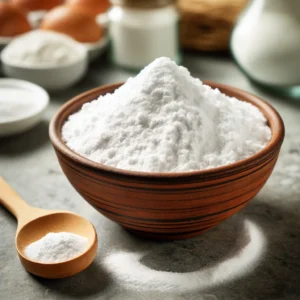
How to Use Baking Soda for Butt Acne Scars and Face Scars
Baking soda balances skin pH to enhance barrier function and health, reducing acne breakouts. Its mild anti-inflammatory properties soothe redness and irritation from acne scars. Although not highly potent, its antibacterial effects help prevent new acne and scars. Additionally, it absorbs excess oil, preventing clogged pores.
- Dilute the Baking Soda: Mix baking soda with water to form a paste using a 3:1 water to baking soda ratio to prevent skin irritation.
- Test for Sensitivity: Apply a small amount of paste to a hidden area of skin and wait 24 hours to check for reactions.
- Cleanse the Area: Clean the affected area with a gentle cleanser and pat dry to ensure effective treatment application.
- Apply Gently: Use fingertips or a soft brush to apply the paste in circular motions without scrubbing hard.
- Leave It On: Let the paste sit for 5-10 minutes, adjusting time based on skin sensitivity.
- Rinse Off: Rinse thoroughly with cool water. Moisturize the face afterward, and ensure the buttocks are dry before dressing.
- Repeat: Use the paste 2-3 times a week, being careful not to overuse it to avoid skin dryness.This method leverages baking soda’s exfoliating properties as part of Home Remedies for Acne Scars, addressing concerns like how to get rid of acne scars on the butt, butt acne scars, and acne scars on the butt, promoting smoother skin.
How Long Does It Take for Scars to Fade
The time it takes for acne scars to fade can vary greatly depending on their severity, your skin type, and the treatment method. Generally, minor scars can begin to fade within a few months with consistent treatment, while more severe scars may take a year or longer. Patience and consistency with your treatment regimen are key.
Conclusion
Home remedies for acne scars are a safe and cost-effective way to reduce the visibility of scars. They can be particularly effective for mild acne scarring and are well-suited for those who prefer natural treatment options. While these remedies can be effective, severe scars often require professional treatment.












